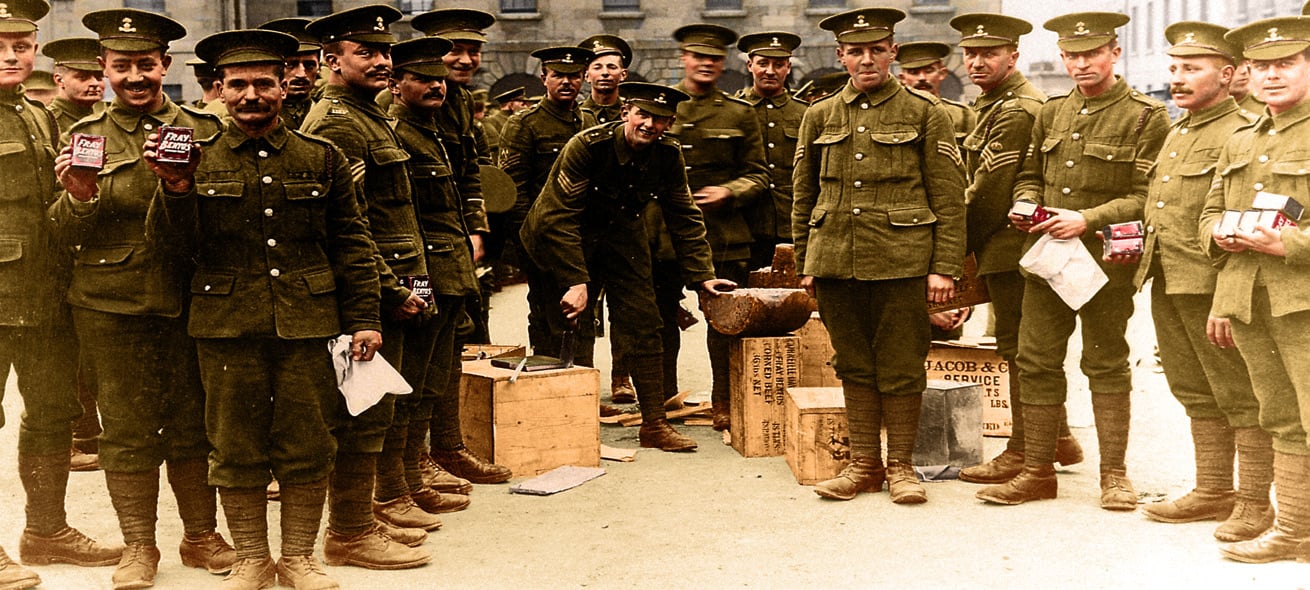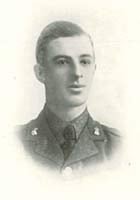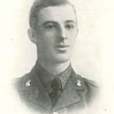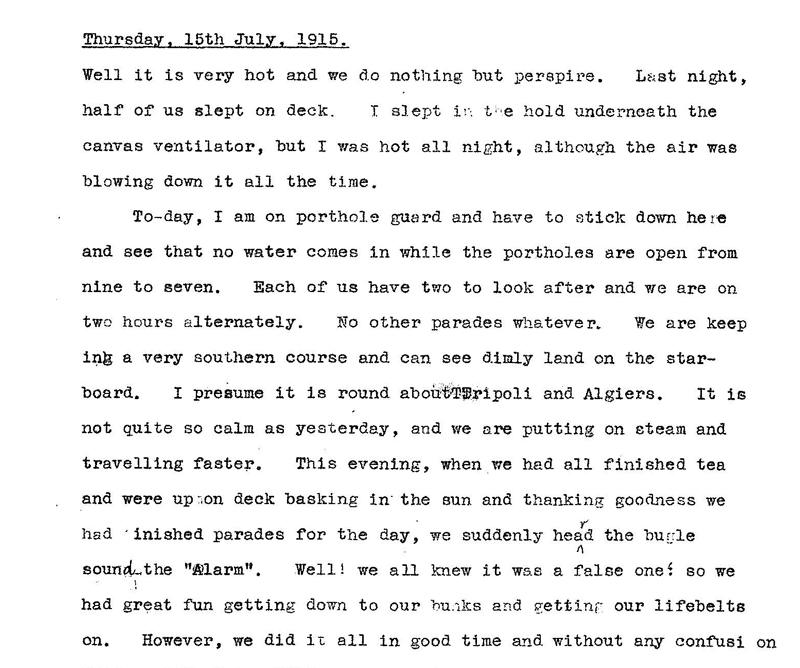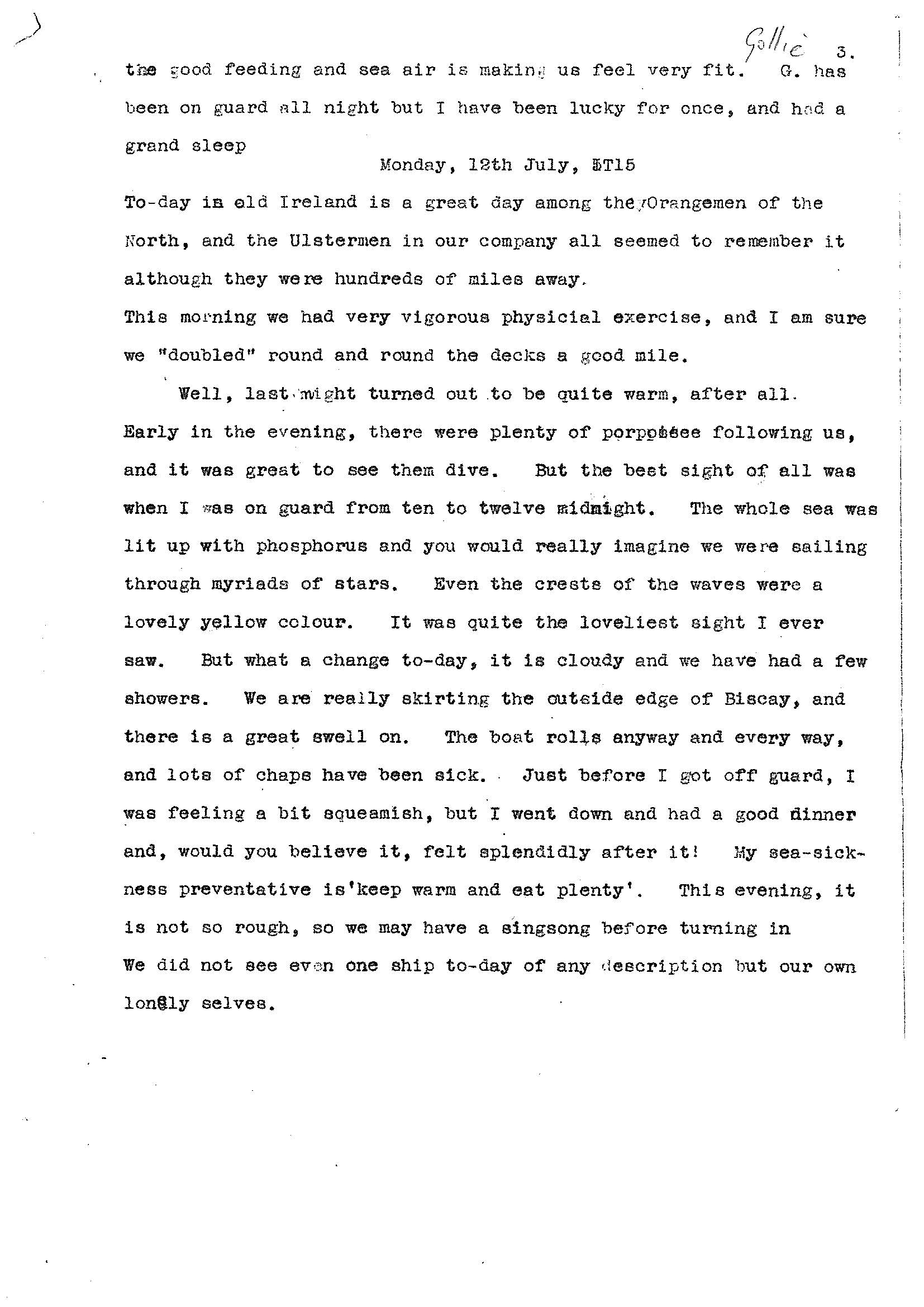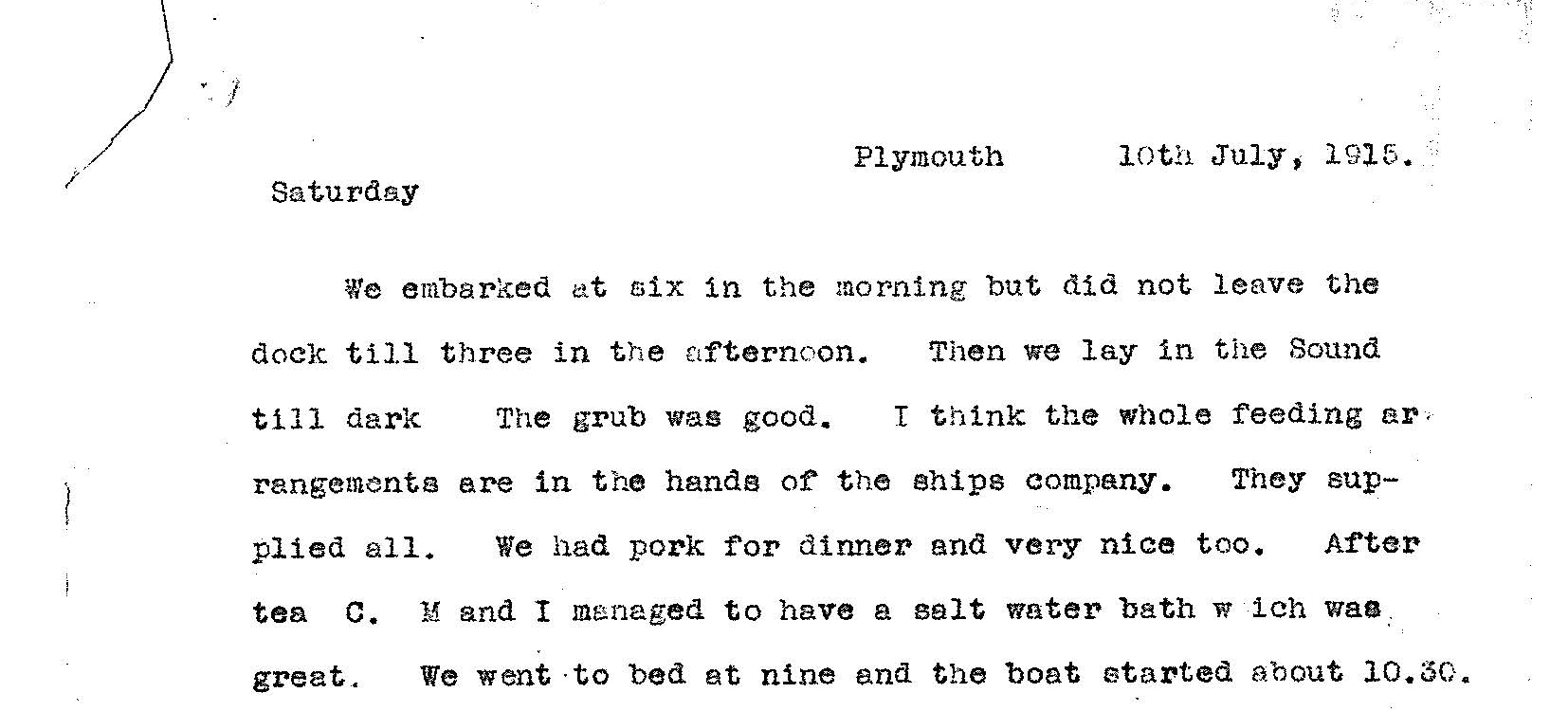Gunning Brothers
6 August
Well, on Friday morning, I remember 6th August, 1915, at
daybreak, a steamer called the ‘Fauvette’ arrived at
Mitylene, and the whole of the 7th Royal Dublin Fusiliers were
drafted on to her. Our diary was parcelled up by C. and given to
a steward on the ‘Alaunia’, as we had heard she
would be soon going home for repairs, and then it could be
posted home to Mother. So, all in the best of spirits, we left
Mitylene, at four o’clock in the afternoon. As usual, poor
old ‘D’ Company were given a rotten part of the
‘Fauvette’ (quite a small boat) that being a large
empty coal cellar which filled the bow of the boat. We had our
tea and breakfast there, and, needless to say, the dirt of the
place had our light drill uniforms in a horrible state. I
remember having a yarn with poor old Sergt C (missing) about
different Dublin people we know, and later on was talking to a
middy on deck who took part in the first landing at the
Dardanelles. As we knew, dear knows when we might get another
night’s decent rest, G., M., J.B. and myself all went up
on deck to sleep under the lifeboats. Though excited, we managed
to get a few hours sleep and, I suppose it was about 3 or 4
o’clock, I awoke to find ourselves off the Gallipoli
coast, thought it was pitch dark.
At first, we could hear the low boom, boom, of the guns in the
distance and gradually I became more distinct. We were not just
off the Peninsula, where the first landing was, and we could see
the star shells shooting up now and again exactly like rockets
at a display at home. Gradually, it became lighter and, though
we could see the land, we could make out no details. We were all
very excited the whole time and, after we had our breakfast, we
came up again on deck and found ourselves off Suvla Bay. It was
full of transports and battleships, and we were right between
two first-class cruisers. Well, the fun had started before we
had arrived, and some troops had ben landed. With the naked eye,
we would see the flash from the Turkish guns coming from the big
ridge of mountains, some shells dropping into the sea in front
of us, and hundreds bursting on land. We could see our men
landing from the lighters, and the stretcher-bearers very busy
bringing down and collecting wounded on the beach.
The battleships were trying to silence the enemy’s guns,
and such an awful fierce roar those naval guns make! The whole
bay was quivering with the vibration, and they had not started
three minutes before my blooming nose began to bleed. The boys
did laugh when they saw me. But we were proud of the Navy!
I think the lighters accommodated a full Company, and on ours of
‘D’ Coy 13 and 14 platoons filled the cabin or
covered part, while 15 and 16 platoons were above the deck. It
was here that we first saw a casualty. Some poor chap lay in the
centre of the hold on a long table. He was unconscious, looked a
nasty green colour, and his head was all bandaged up. Evidently,
he had been hit on landing and was just put back on to the
lighters; and, as they had no time to put him on to a Hospital
ship, he had to be brought back with our lot until that lighter
had the troops,detailed [sic] for it, landed. Well, we got unto
the beach safely, but others were not so lucky. A shell hit
‘A’ Company’s boat and three or four were
killed and several injured. Sgt B. being injured, also. I
believe the poor chaps were all japed with blood and the deck
was all red. Well, we immediately threw off our packs, and
started off in sections, the ‘bould SG leading our No 2
section.
At first, a blooming shell lit about three or four hundred yards
away and we of No 7 section immediately lay flat on the ground.
But it was remarkable how used one gets to it, and in a few
minutes we never bothered ‘ducking’, unless the
shell was quite close to us. Before I go on, I must say the
discipline stood to us marvellously; we seemed to do the right
thing at the right time mechanically, for you must remember we
were more of less stupefied.
We got on passed stretcher-bearers, wounded, dying and dead and
though at first we did not like looking at them, we got used to
that also and didn’t bother. After crossing these low
cliffs or sandhills, we arrived at a long strand. In one glance
it looked awful. Shells dropping in the water, boats and
pinnaces trying to tug out loads of wounded, the strand littered
with casualties and more shells dropping, in the long grass of
the sand dunes behind, men groaning and the RAMC working and the
bandaging like fury.
We then moved forward again and took a turn to the right, having
the Salt Lake on our right flank and Chocolate Hill straight in
front of us. As we advanced over these barren fields the shells
were falling everywhere, and soon we were under rifle fire as
well, so we opened out into extended order at about ten paces
interval.
Well, it happened that most of us in ‘D’ Company did
get right through, though I saw one chap who had got a bit of
shrapnel in the thigh, and there were one or two chaps in the
battalion who were never seen after that advance.
I now found myself with CF on the right and C, I mean F on the
left, and we all lay with our backs and heads well covered under
a low bank waiting for the next run forward. Sometimes, we would
be waiting for only a few minutes before advancing, but before
the end of the day we would be half an hour or more. Suddenly,
without any warning, a blooming shell came down with an awful
thud not five yards in front of us. The three of us were covered
with clay and sand, but not a splinter or a bullet got any of
us. C leaned over and shouted ‘Are you hit G?’ and I
said ‘No, are you?’ so I brushed the sand out of my
eyes and clothes. Did you ever hear of a more narrow shave? Well
says G to me, ‘there’s no use us being hit together,
so we’ll separate and you go to the right and I’ll
go to the left.’ So, very soon, as all the regiments were
all intermingled with each other by now, I found myself with no
one I know but ‘Crackers’ all is Noonan. So I
determined to stick to him by hook or by crook.
It is impossible to give an accurate account of the day. Now it
all seems like a dream; and you must remember we were absolutely
dazed and stunned with excitement and the noise. In fact, we did
everything mechanically, and I believe we owed it all to the way
in which disciplined had been drilled into us. However, I
remember, when we got to Chocolate Hill, we heard a great cheer
as the first line, including some of our men and most of A Coy
took part, drove the Turks right over at the joint of the
bayonet. We had now occupied all the trenches on the hill, and
night found the Turks a good mile away on the low slopes of the
big range of mountains in front. The range I mean runs right
down the peninsula to Achi (missing) and on these mountains the
enemies big guns were all placed. Chocolate Hill is only a mere
hill in the vast plain before reaching the main ridge. Before
all this, as it was getting dark, we risked standing up and
trying to collect ourselves together, though there was still
come rifle fire. I saw HD our hardly old Colonel, in the
distance talking to somebody in a devil-may care fashion as if
he was strolling about a garden, with his walking stick in his
hand.

